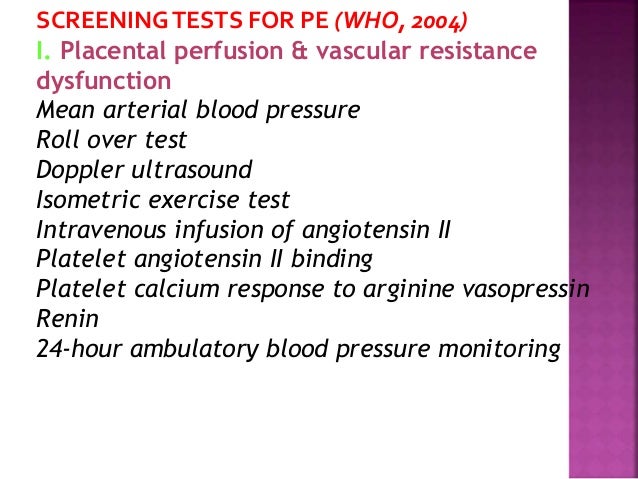Your Pre eclampsia screening blood test images are available. Pre eclampsia screening blood test are a topic that is being searched for and liked by netizens now. You can Find and Download the Pre eclampsia screening blood test files here. Download all free images.
If you’re looking for pre eclampsia screening blood test images information related to the pre eclampsia screening blood test keyword, you have pay a visit to the right blog. Our site always provides you with hints for viewing the highest quality video and image content, please kindly surf and locate more informative video content and graphics that fit your interests.
Pre Eclampsia Screening Blood Test. Placental Growth Factor PlGF is the preferred serum marker for pre-eclampsia prediction. The patients blood pressure should be measured while she is relaxed quiet and in a sitting position. Screening uses the same blood sample collected for CFTS. Blood testing identifies preeclampsia disease risks in pregnancy months before symptoms.
 Preeclampsia Screening In The 19th 22nd Gestational Week From ultraheli.ee
Preeclampsia Screening In The 19th 22nd Gestational Week From ultraheli.ee
Screening uses the same blood sample collected for CFTS. It involves a simple blood test and measurement of your blood pressure. This screening test is done during the first trimester 11 to 14 weeks to identify if you are at high risk of developing pre-eclampsia particularly before 37 weeks gestation. In the past there was no way of screening for pre-eclampsia. Two blood pressure measurments on each arm. The patients arm should be at the level of the right atrium of the heart.
The risk of pre-eclampsia is higher if you have had previous blood pressure problems.
It is one of the most common life threating. Blood pressure measurements are routinely used to screen for preeclampsia. But less than 1 in 200 05 will get severe pre-eclampsia before 34 weeks gestation. Screening uses the same blood sample collected for CFTS. Screening uses the same blood as your CFTS test You must opt-in for PE screening on the CFTS test request form Screening requires. Blood tests and thresholds for medical review.
 Source: slideplayer.com
Source: slideplayer.com
The current NICE guidance has said that in women whom doctors think may have pre-eclampsia and who are between 20 weeks and 34 weeks in. The blood test results are combined with. Screening uses the same blood sample collected for CFTS. But less than 1 in 200 05 will get severe pre-eclampsia before 34 weeks gestation. Serum urate mean for gestational age 2SD.
 Source: sciencedirect.com
Source: sciencedirect.com
The PlGF test is suited to pregnant women of any age or risk category. Screening for Early-onset Pre-eclampsia is offered by Femina as an option with the combined first trimester screening test CFTS patients must opt-in on the test request form. Testing to detect the pre-eclampsia may use either PlGF alone which may be lower in pre-eclampsia or a measurement of both proteins where the increased ratio of sFlt to PlGF can guide the diagnosis towards pre-eclampsia. The patients blood pressure should be measured while she is relaxed quiet and in a sitting position. This is pregnancy induced high blood pressure and occurs in around 2 8 of pregnancies.
 Source: researchgate.net
Source: researchgate.net
Platelet count 150x109l. But less than 1 in 200 05 will get severe pre-eclampsia before 34 weeks gestation. The PLGF test is the first-of-its-kind in the world to check for pre-eclampsia the NHS noted. Platelet count 150x109l. In the past there was no way of screening for pre-eclampsia.
 Source: thelancet.com
Source: thelancet.com
It is one of the most common life threating. Testing to detect the pre-eclampsia may use either PlGF alone which may be lower in pre-eclampsia or a measurement of both proteins where the increased ratio of sFlt to PlGF can guide the diagnosis towards pre-eclampsia. A blood test to measure PaPP-A and PLGF protein which are both produced by the placenta. Is an advanced blood test that helps determine your risk for early onset preeclampsia. The risk of pre-eclampsia is higher if you have had previous blood pressure problems.
 Source: ultraheli.ee
Source: ultraheli.ee
It affects 2-5 of all pregnant women. The patients blood pressure should be measured while she is relaxed quiet and in a sitting position. Two blood pressure measurments on each arm. The blood test results are combined with. Blood testing identifies preeclampsia disease risks in pregnancy months before symptoms.
 Source: obgyn.onlinelibrary.wiley.com
Source: obgyn.onlinelibrary.wiley.com
The PlGF test is suited to pregnant women of any age or risk category. But even low risk women can get it. Preeclampsia Screen T1 SM is an advanced blood test that helps determine your patients risk for early onset preeclampsia. If the patients upper arm circumference is 33 cm a. It involves a simple blood test and measurement of your blood pressure.
 Source: slideplayer.com
Source: slideplayer.com
If the patients upper arm circumference is 33 cm a. Screening uses the same blood sample collected for CFTS. The PlGF test is suited to pregnant women of any age or risk category. Trials of the new PLGF blood test which costs about 70 show it speeds up diagnosis meaning life-threatening complications to the mother and baby can be avoided. An ultrasound examination may be included.
 Source: ultraheli.ee
Source: ultraheli.ee
Screening uses the same blood sample collected for CFTS. You will also be asked some basic questions about your medical history and pregnancy. Pre-eclampsia screening is done in the first trimester when your baby is at least 11 weeks old and less than 14 weeks old. It affects 2-5 of all pregnant women. AST or ALT mean for gestational age 2SD.
 Source: efcni.org
Source: efcni.org
The patients blood pressure should be measured while she is relaxed quiet and in a sitting position. Preeclampsia Screen T1 SM is an advanced blood test that helps determine your patients risk for early onset preeclampsia. The blood test results are combined with. Blood tests and thresholds for medical review. You will also be asked some basic questions about your medical history and pregnancy.
 Source: aafp.org
Source: aafp.org
But less than 1 in 200 05 will get severe pre-eclampsia before 34 weeks gestation. An ultrasound to assess blood flow to the uterus. In the past there was no way of screening for pre-eclampsia. AST or ALT mean for gestational age 2SD. It involves a simple blood test and measurement of your blood pressure.
 Source: ultraheli.ee
Source: ultraheli.ee
If your PIGF levels are high its highly likely that you do not have pre-eclampsia. This screening test is done during the first trimester 11 to 14 weeks to identify if you are at high risk of developing pre-eclampsia particularly before 37 weeks gestation. Screening uses the same blood sample collected for CFTS. Pre-eclampsia screening is done in the first trimester when your baby is at least 11 weeks old and less than 14 weeks old. Blood pressure measurements are routinely used to screen for preeclampsia.
 Source: vcgs.org.au
Source: vcgs.org.au
Internationally preeclampsia is defined as new-onset gestational hypertension systolic blood pressure 140 mmHg andor diastolic blood pressure 90 mmHg associated with new-onset of at least one of proteinuria maternal organ dysfunction liver neurological haematological or renal involvement or uteroplacental dysfunction at or after 20 weeks. The blood test results are combined with. Your risk of developing pre-eclampsia is calculated from the results of. What is the pre-eclampsia test. Blood pressure measurements are routinely used to screen for preeclampsia.
 Source: efcni.org
Source: efcni.org
Screening for preeclampsia - best combined with Combined Test or with NIPT The old name toxaemia German for. It measures levels of a protein called placental growth factor PIGF. Performed between 10 weeks 0 days and 13 weeks 6 days of pregnancy NTDs preeclampsia screening test combines personal history ultrasound measurements blood pressure and analysis of three biological markers in the. It involves a simple blood test and measurement of your blood pressure. Preeclampsia is pregnancy complication affecting 2-5 of all pregnancies and has a high.

Blood testing identifies preeclampsia disease risks in pregnancy months before symptoms. Screening for early-onset pre-eclampsia is an optional test that is performed alongside Combined First Trimester Screening CFTS. In the past there was no way of screening for pre-eclampsia. Performed between 10 weeks 0 days and 13 weeks 6 days of pregnancy NTDs preeclampsia screening test combines personal history ultrasound measurements blood pressure and analysis of three biological markers in the. Placental growth fac-tor is a marker for early onset pre-eclampsia in pregnancy.
 Source: ejog.org
Source: ejog.org
But less than 1 in 200 05 will get severe pre-eclampsia before 34 weeks gestation. It involves a simple blood test and measurement of your blood pressure. Performed between 10 weeks 0 days and 13 weeks 6 days of pregnancy NTDs preeclampsia screening test combines personal history ultrasound measurements blood pressure and analysis of three biological markers in the. Screening uses the same blood sample collected for CFTS. Testing to detect the pre-eclampsia may use either PlGF alone which may be lower in pre-eclampsia or a measurement of both proteins where the increased ratio of sFlt to PlGF can guide the diagnosis towards pre-eclampsia.
 Source: efcni.org
Source: efcni.org
The patients arm should be at the level of the right atrium of the heart. How is pre-eclampsia screening performed. The PlGF test is suited to pregnant women of any age or risk category. An ultrasound examination may be included. Screening for Early-onset Pre-eclampsia is offered by Femina as an option with the combined first trimester screening test CFTS patients must opt-in on the test request form.
 Source: researchgate.net
Source: researchgate.net
Two-stage screening for preterm preeclampsia at 11-13 weeks gestation Two-stage screening and biomarker testing for only part of the population will have financial benefits over conducting the test for the entire population. The blood test results are combined with. Fortunately this is not completely true. The PLGF test is the first-of-its-kind in the world to check for pre-eclampsia the NHS noted. This screening test is done during the first trimester 11 to 14 weeks to identify if you are at high risk of developing pre-eclampsia particularly before 37 weeks gestation.
 Source: slideshare.net
Source: slideshare.net
Fortunately this is not completely true. Blood pressure measurements are routinely used to screen for preeclampsia. An ultrasound to assess blood flow to the uterus. Preeclampsia is pregnancy complication affecting 2-5 of all pregnancies and has a high. Placental Growth Factor PlGF is the preferred serum marker for pre-eclampsia prediction.
This site is an open community for users to submit their favorite wallpapers on the internet, all images or pictures in this website are for personal wallpaper use only, it is stricly prohibited to use this wallpaper for commercial purposes, if you are the author and find this image is shared without your permission, please kindly raise a DMCA report to Us.
If you find this site serviceableness, please support us by sharing this posts to your preference social media accounts like Facebook, Instagram and so on or you can also save this blog page with the title pre eclampsia screening blood test by using Ctrl + D for devices a laptop with a Windows operating system or Command + D for laptops with an Apple operating system. If you use a smartphone, you can also use the drawer menu of the browser you are using. Whether it’s a Windows, Mac, iOS or Android operating system, you will still be able to bookmark this website.






